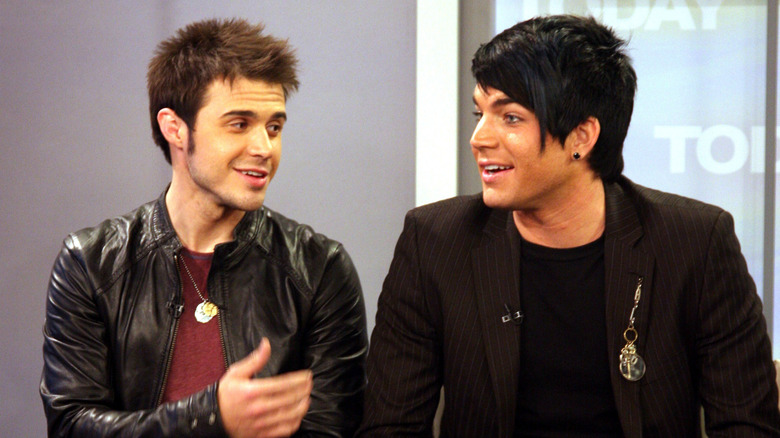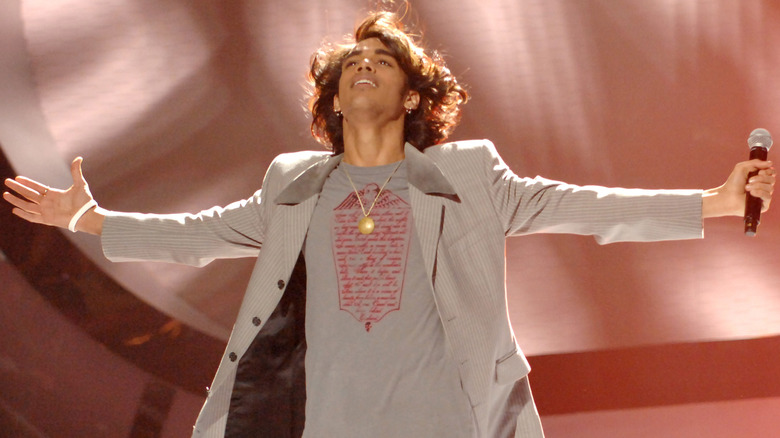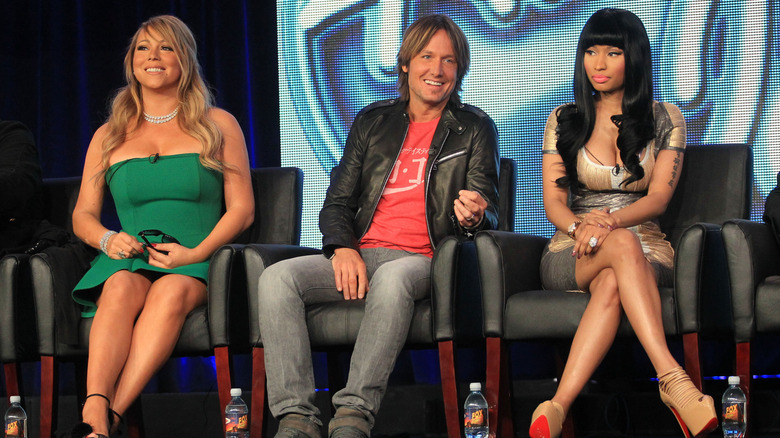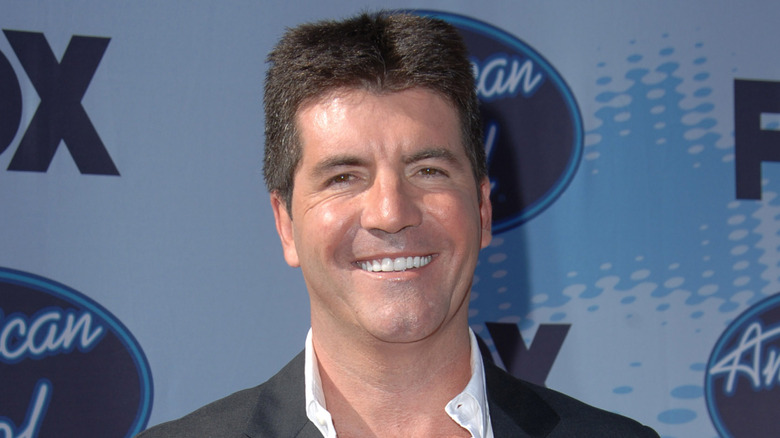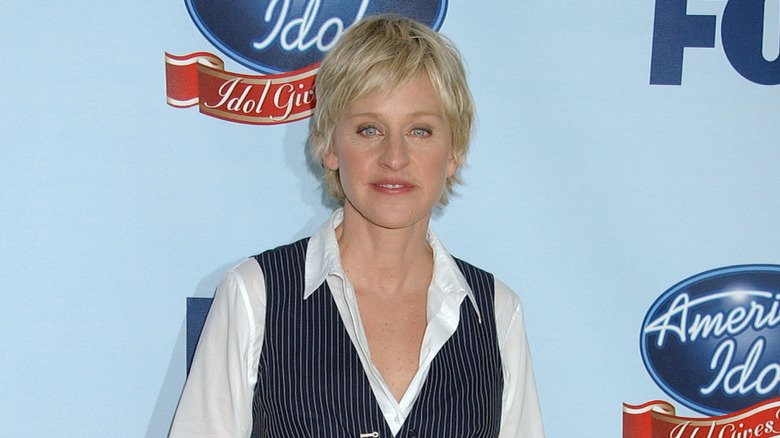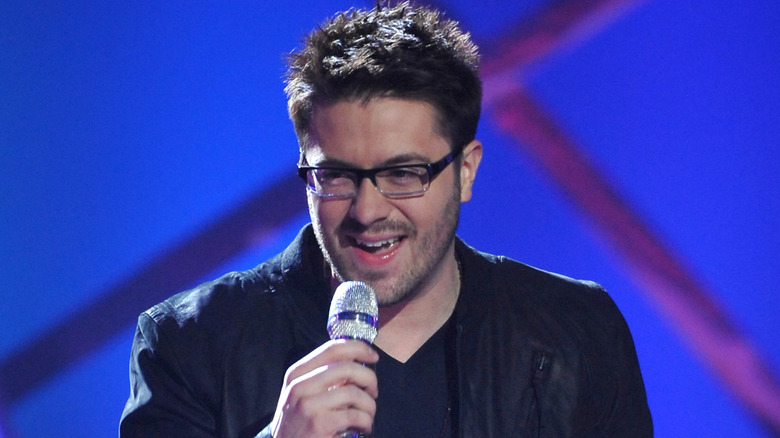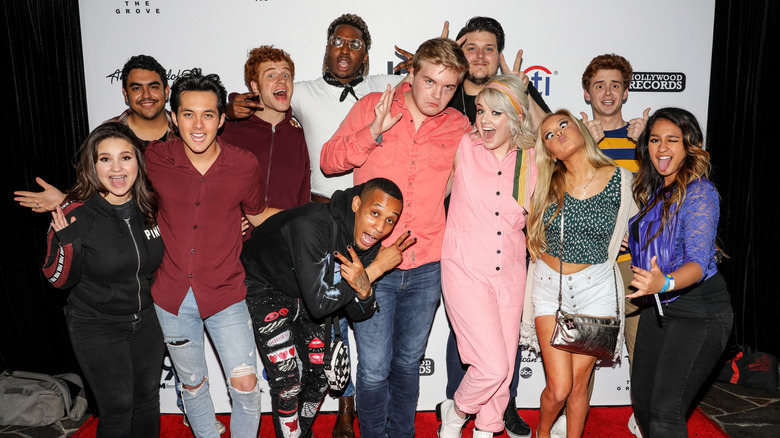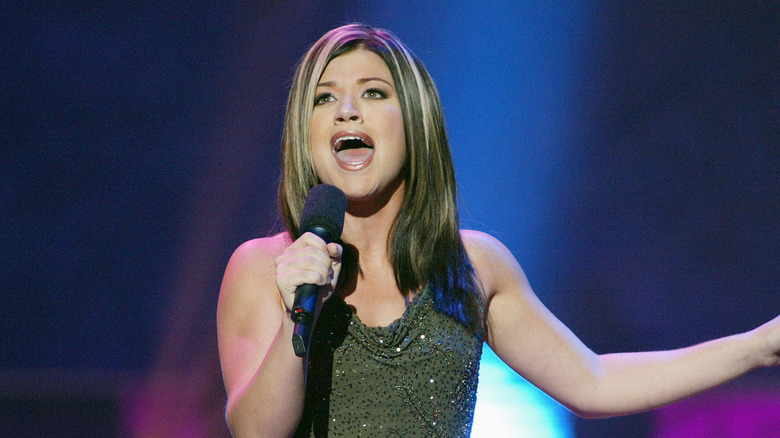Reasons American Idol Is Fake
With 22 seasons under its belt at the time of this writing, "American Idol" is one of the longest-running reality TV shows out there. It's also a competition that many believe is long past its sell-by date, with its relevance in the pop culture zeitgeist having fallen off a cliff since its peak years in the mid- to late 2000s and early 2010s. Not even a revival on ABC has been able to bring "Idol" back to its glory days, and the presence of big names such as Lionel Richie, Katy Perry (at least before her 2024 departure), and Luke Bryan on the panel of judges hasn't helped much either. And just like a plethora of other reality shows, it has been accused numerous times of not being as real as it should be.
Does that mean "American Idol" is as fake as "Catfish" or any other program where the producers control the stars' narratives for the sake of ratings? Sometimes, but not always. Contestants have to follow strange rules, written or otherwise, as those on other reality shows should. And the final results at the end of the season aren't always seen as being on the up-and-up. These are just some of the reasons why "American Idol" has been perceived as fake, so let's take a closer look at them, as well as other signs that the show doesn't always live up to its "reality" billing.
The voting might have been rigged in some seasons
Season 8 of "American Idol" came down to two singers with totally different styles. Adam Lambert was considered the overwhelming favorite, wowing fans and judges alike with his charismatic, over-the-top performances and flamboyant rock 'n' roll attitude. From Lambert's life-changing "Idol" audition to his impactful and unique takes on songs such as Johnny Cash's "Ring of Fire," he had future star written all over him. Meanwhile, Kris Allen was practically his rival's polar opposite, specializing mainly in understated acoustic numbers as he quietly beat the odds to make it to the finals. But while Allen's underdog story had a happy ending, doubts were almost immediately cast on the legitimacy of his upset victory.
Apparently, representatives from "Idol" telecommunications partner AT&T instructed voters from Allen's home state of Arkansas on how to send "power texts," which allowed them to cast upwards of 10 votes with just one message. This may have given Allen an unfair advantage over Lambert, and AT&T would later confirm to CNN that some of its Arkansas-based employees did indeed get carried away while promoting the eventual Season 8 winner at local watch parties. "Caught up in the enthusiasm of rooting for their hometown contestant, they brought a small number of demo phones with them and provided texting tutorials to those who were interested," the company said in its statement.
Even then, original "American Idol" network Fox issued its own statement, stressing that "[i]n no way did any individuals unfairly influence the outcome of the competition."
Vote for the Worst
It wasn't just big companies suspected of rigging "American Idol" voting during its run on Fox; an ordinary fan, or should we say "hate watcher," did everything in his power to convince viewers to "vote for the worst" and make a mockery of the singing competition's results. In 2004, Dave Della Terza started the website Vote for the Worst with that goal in mind, and it was in 2007, during Season 6 of "American Idol," when the site ran its most infamous — and arguably most successful — campaign. Despite consistently receiving criticism for his lackluster singing and unorthodox fashion statements, Sanjaya Malakar made it all the way to seventh place in Season 6, and it was in no small part thanks to VFTW's throngs of devotees that the Federal Way, Washington, teen lasted much longer than the judges felt he should have.
Aside from the ever-so-divisive Malakar, VFTW successfully endorsed contestants such as Season 4's Scott Savol and Season 9's Tim Urban, who admitted feeling unhappy that the website gave him so much support. VFTW soldiered on until 2013, when Della Terza confirmed that he would be shutting down the site after Season 12 of "Idol," citing the show's waning popularity and declining star power as the main reasons for his decision.
Contestants only have a limited number of song choices
Back in the early days of "American Idol," contestants could choose practically any song they wished when performing in themed rounds. This, of course, allowed them to showcase their individuality, but producers weren't too happy with some of the more obscure or ill-fitting choices. As such, "Idol" made some changes in Season 7 in 2008, forcing contestants to pick from a pre-approved list of about 50 songs for these themed rounds.
According to executive producer Nigel Lythgoe, the decision was all about developing a deeper audience connection. "Asking America to vote on a performer they don't know with the possibility of a song they don't know we felt was not right, and there were some strange songs," he told the Buffalo News (via Today).
Granted, song choices can make or break a contestant — they can elevate less obviously skilled performers but also cause top favorites to crash out of the competition. And there's always a risk involved when choosing a song that not even your parents may have heard of. But it can also be said that giving "Idol" contestants more freedom to choose themed songs, particularly those from long-ago decades, could introduce these tunes to new audiences from younger generations, especially in this social media-driven era where virality can make a huge difference in a song's popularity.
Manufactured feuds between judges
Nothing says "Our reality show's ratings are tanking, and we need to be relevant again" better than a fake feud involving the program's stars. In this case, it's the judges of "American Idol" who were allegedly involved in bogus beef on camera and behind the scenes. Back in 2012, during regional auditions for Season 12 of "American Idol," Mariah Carey and Nicki Minaj kicked off an ostensibly bitter feud, with the rapper pounding her fist on the table when she felt the pop-R&B icon got too chatty with a contestant. The sniping between the two women was on full display in the Season 12 premiere, as Carey poked fun at Minaj's feathered hat and later got cussed out by her rival while she was talking up the resurgent chart success of her holiday staple "All I Want for Christmas Is You."
Sure, it made for spicy television, and it was a musician feud that looked like it was getting out of hand. But as Carey claimed during a 2015 appearance on "The Kyle and Jackie O Show," the rivalry with Minaj was nothing but manufactured drama. "I'm not going to get into what it was, but let's just say I don't think they had any intentions for us to have a good experience doing that show," she said. "Pitting two females against each other wasn't cool ... It should have been about the contestants instead of about some nonexistent feud that turned into even more ridiculousness."
Simon Cowell wasn't the meanie he appeared to be on-screen
During his time on "American Idol," Simon Cowell was arguably just as entertaining, if not more so, than the contestants themselves. With his trademark brand of brutal honesty mixed with healthy doses of sarcasm and a tinge of dry British humor, Cowell expertly tore down performers whom he felt weren't cut out for the bright lights of Hollywood. Yes, there were times during the show's first nine seasons when his negative comments bordered on verbal bullying, but it was all part of his brand as the "mean judge" of "American Idol." But as a former Fox executive revealed well after Cowell's 2010 departure from "Idol," he was simply being a big old meanie for the cameras.
Speaking at a press event in 2022, former Fox President of Alternative Entertainment Mike Darnell explained that Cowell, who had already built up a reputation as the "frank judge" on the U.K.'s "Pop Idol" in the early 2000s, was handpicked to play a similar, albeit even more scathing role on the show's American version. "Simon Cowell learned the character," he said (via Deadline). "Underneath, he's a different character. Watch 'Britain's Got Talent' or 'America's Got Talent' now, and he's a much softer version now."
While Cowell was a good judge of talent who was often in the right whenever he'd call out contestants, learning that his harsh way of doing so was mostly an act does lend a lot of credence to the argument that "American Idol" isn't as real as a reality show should be.
Some judges seemed in way over their heads
For every Simon Cowell or Randy Jackson who earned respect as "American Idol" judges who knew whereof they spoke, there were some who were perceived as having no business helping America decide the fate of the show's contestants. These days, Ellen DeGeneres may be known as a talk show host who turned out to be less than pleasant behind the scenes, but in 2010, she had a brief (and forgettable) stint as a judge on "American Idol." The comedian later revealed on "The Howard Stern Show" (via TheWrap) that she felt joining "Idol" was a huge mistake, and that she had a hard time delivering critical feedback to the show's contestants.
"As a fan of the shows, it doesn't matter that I sing or I know anything about pitch," DeGeneres told Stern. "I'm like everybody else at home, so I thought I'm gonna represent those people at home that have opinions ... But then I just thought, like Howard says, I can't break this person's heart. Let somebody else do that."
Unlike DeGeneres, Kara DioGuardi had industry experience as a singer-songwriter, but her time on "Idol" wasn't much better. She received flak for her frequent verbal bloopers (remember the New York nightclub "Studio 57" or when those young whippersnappers from Aerosmith had an early hit in 1993's "Cryin'"?) and supposed stiff demeanor, and few tears were shed when she left the show in 2010 after just two seasons.
The sadder the story, the greater the exposure
"American Idol" fans know the drill with this one. They're sometimes called "very special contestants," a reference to those dark and atypically serious TV episodes from the '80s and '90s that were advertised as "very special." And while many of these contestants' backgrounds are genuinely touching and heartbreaking, "American Idol" tends to overhype their stories and give them precedence over their actual singing.
Season 8's Danny Gokey (pictured) and Season 10's Chris Medina probably come to mind for longtime viewers, with the former trying out just weeks after his wife's death from congenital heart disease and the latter accompanied to his audition by his fiancee, who used a wheelchair as a result of a brain injury. Both proved to be talented singers, but as Season 8 hopeful Ju'Not Joyner told ABC News, the focus on their sad stories made "Idol" akin to "Maury" and other sensationalist talk shows. "I think it wouldn't be so sickening if it were across the board, if everyone got the same exposure, the same coverage," he said. "I think it's really unfair when you don't spread the love around to everyone."
Alas, it seems that "Idol" hasn't learned its lesson when pushing contestants with sad backstories. Several Redditors complained about this issue in a 2024 thread, with the original poster noting that they didn't want to be reminded of their own struggles while watching a singing competition. "This show is supposed to be a distraction from the troubles of everyday life, not make the viewer break down while watching," wrote u/pink_faerie_kitten.
Not all contestants' sad stories are 100% legit
Given the overemphasis on contestants' stories of personal loss and struggle, it shouldn't come as a surprise that some "American Idol" hopefuls have tried to take advantage of this by telling half-truths or outright lies about their supposedly tragic past, all to earn brownie points with the judges. Season 12's Matt Farmer is a particularly notable example; while accompanied onstage by his young daughter, he discussed how he suffered a traumatic brain injury while serving in Iraq before belting out his version of Sam Cooke's "A Change Is Gonna Come." Farmer impressed the judges, and he received a golden ticket. All's well that ends well, right? Not quite.
Soon after Farmer's audition aired, several of his fellow soldiers took to the internet to call him out for lying about his time in Iraq. Allegedly, Farmer was never hit by an improvised explosive device (IED), as he had claimed; worse, he was accused of engaging in some seriously shady behavior during the dangerous mission where he suffered his supposed injury. Multiple soldiers claimed that Farmer had an allergic reaction after mixing alcohol with his acne medication (both of which were forbidden) and later snitched on everyone he was drinking with. Farmer, who was medically discharged soon after that incident, ultimately admitted in a statement that his "Idol" story was all lies, and he was removed from the competition.
Producers predetermine your narrative on the golden ticket
It all seems so cut and dried — especially good singers get the highest praise from the judges or are even described as musical legends in the making, while the ones with noticeable imperfections in their singing get the least love. Apparently, there's more to it than that.
According to a blog post from Season 10 contestant Maria Saint, "Idol" hopefuls who successfully hurdle their auditions are coded based on a letter found on their golden tickets. A "Y" on the ticket means yes, the contestant is heavily favored to go far in the competition, while a "K" is a keeper who's good enough to at least make the numbers for most of the rounds leading up to the finals. An "N," unfortunately, means no, the contestant won't cut the mustard in comparison to their Hollywood Week peers. She also mentioned a star marking, which means the contestant either has a "special story" worth sharing or is someone the producers feel deserves to make it to Hollywood Week or beyond.
Saint's post also included a dire warning for anyone who gets an "N" on their golden ticket. "[I]f you're an N and you want to see the process and you're okay with the fact that you may be humiliated and that's alright with you, then by all means, take the chance-of-a-lifetime experience," she wrote. "You might even be able to change the judges' minds later on down the line. But, I promise you, if you are marked as an N, they already have their minds made up about you and it will not change."
Winning does not guarantee superstardom
"American Idol" is, in theory, a launching pad for would-be musical icons, with each season's winner having the best chance of reaching such an exalted status. The show got off to a good start when Season 1 winner Kelly Clarkson became a mega-successful pop star and, later on, a respected talk show host. Carrie Underwood likewise became a household name in country music soon after she won Season 4. But one would be hard-pressed to count off "Idol" winners who have achieved similar levels of notoriety on the fingers of one hand. Season 5 winner Taylor Hicks might have seemed like an outlier when his debut album was a relative flop, but there were many subsequent winners whose album sales fell even flatter.
In contrast, several "American Idol" runners-up have outperformed their respective seasons' winners, may it be in terms of album sales, chart rankings, or overall fame. You only need to look at Jennifer Hudson, Chris Daughtry, Clay Aiken, and Adam Lambert as examples of contestants who fell short of winning the big one on "Idol" but went on to enjoy greater success than their final placing suggests. That's not exactly unusual in reality talent competitions, but it says something about a show's star-making ability when most of the winners likely won't be recognized on the street if encountered by a casual music fan.

